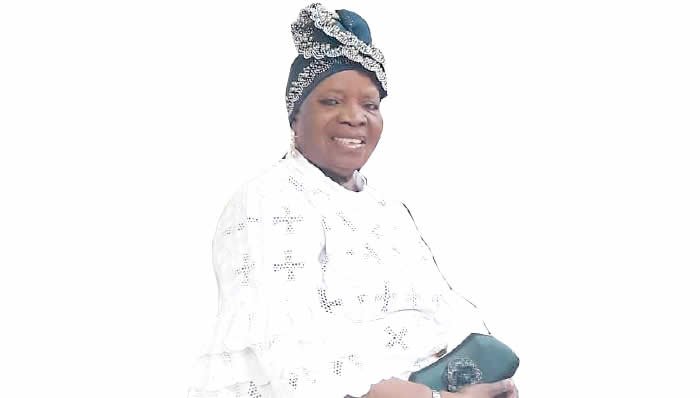
84-year-old retired Major Hassan Oyedeji tells EMMANUEL OJO about her military career and family life
You recently celebrated your 84th birthday. How do you feel at 84?
Well, all I know is that I’m ageing. It’s not like before that I could run around and do many things. Now I know that age is telling on me. There are a lot of things I love to do (that I can no longer do) – many things that I used to do all by myself that I wouldn’t allow people to do for me. For instance, I liked washing my clothes and ironing them; cooking and so on. I usually preferred to do those chores by myself because I was hardly satisfied if someone else did them for me. But now that age has started telling on me, I just allow people to do whatever they can. But I still go to the kitchen to cook my stew, whether it’s sweet or not, it’s my own (laughs).
Do you have a special kind of stew you make?
I make all kinds. What is important is that I make them myself.
Where did you study nursing?
I studied nursing at Wesley Gate Hospital, Ilesha, Osun State. I later went to the United Kingdom and did some other courses. I did midwifery here (in Nigeria) and when I got to the UK, I repeated it and did some other courses.
When did you return to Nigeria from the UK?
I came back to Nigeria in 1974.
How did you get into the Nigerian Army?
When I came back from the United Kingdom in 1974, I wrote a job application to the Ministry of Health. While I was waiting for a reply, one of my in-laws, who was in the army, visited us. At that time, my two children and I were admitted to the IDH (Infectious Disease Hospital), Yaba. When my in-law came, she asked my husband if I had got a job but my husband said I had not. She then informed us that there were vacancies for nurses in the army, medical corps. She checked my application and helped me to modify it to be fit for purpose. So, I applied and when they called me for an interview, I followed the process and then, I realised that the salary was even better than that of the civil service. That was how I started my ‘Left-right! Left-right! (military drill)’. Just like a joke, that was how the whole journey began. We were first taken to the Badagry Cantonment, where we had our training.
It was a new experience for me. It took me some time to get used to military life. I started on W1 (Warrant Officer 1) rank. After some time, I was commissioned to Lieutenant. Gradually moving up there, I attained the rank of Captain, then Major, then Substantive Major before I retired in December 1990 as a Major.
Was your husband okay with your joining the military?
My husband approved of it. He suggested it anyway. Although, after I joined the Nigerian Army, my husband would look at me at times and would wonder if I were the same wife he married. Each time he raised that, I reminded him of his approval in the first place.
It is common knowledge that the training in the military is tough and toughens one up. Did that reflect in your attitude at home?
Yes. My husband voiced out at some point. In fact, my son at some point would tell me that, “Mummy, we are not in the barracks o,” (laughs). When we were living in Anthony, there was this woman who was a Lieutenant Colonel living next to our house. Each time the woman started shouting, my husband would tell me, “Your sister has started shouting again.” The discipline was there and my children learnt a lot. With me, there is no nonsense.
How long did you serve in the Nigerian Army?
Almost 17 years.
How was the experience like for you in general?
I really enjoyed the military later on because of the discipline. They have a fantastic culture of discipline. Even till now, it has built some sort of courage in me. The only person I fear is God. There is no place I want to enter that I will feel shy, unlike it was before. The military training toughens one up. When I was posted to Benin, I usually drove from Lagos to Benin all alone and all by myself. I usually had fried meat, food and extra petrol in the boot of the vehicle; so, there was really nothing to be scared of. I also had kola nuts. So, I just drove all the way to Benin. At times my husband would be amazed at my courage and asked if there were some soldiers who came along with me on the journey or drove me. Sometimes, on my way back from Benin to Lagos, some soldiers going that way would request to ride with me.
Do you have some memories or experiences that particularly stood out as unforgettable?
So many memories. One thing about the military is that if your junior or your child joins the military before you, that person automatically becomes your senior. You have to obey and respect that person. For example, if my son is in the army and he joined before I did, he automatically becomes my senior and I have to respect him. Each time he passes by, I have to salute him and if I don’t salute, someone else will challenge him and might even seize his rank. The military is good if you are able to cope.
Were there many other women?
Not really, except those in the nursing, catering and other departments where women are predominant.
What were the challenges you had as a woman in the military?
They tell you that there’s no woman in army. Like when we went to the NDA (Nigerian Defence Academy) then, Brigadier General Raji Rasaki was our directing staff. Many times, we were in the bush. At times when we went to him to request permission to change up during our menstrual flow, he wouldn’t grant it. He would say there was no woman in the army. He granted the request on some occasions though.
Did you face any form of discrimination from your male colleagues?
No discrimination. As a woman in the military only you can discriminate against yourself. The only thing is that you have to respect your seniors and follow instructions.
Were there roles or tasks females were excluded from?
The women are actually supposed to give helping hands here and there. In the medicals, you wouldn’t expect to see many male nurses, although, in the military, there’s a school of nursing where men go to for training. The medicals are mostly dominated by women.
How were you able to balance your roles as a wife, mother and a soldier?
Initially, I was working in Lagos. I was posted to Oshodi Resettlement Centre. Later on, I was posted to Benin. When they posted me to Benin, my children were still in primary school, Command Children School. It is for such reason that you see Command Children School around resettlement area and cantonment. They are for soldiers’ children, so that if one is posted, the children will be able to still continue their education. When I got to Benin, I didn’t quite like the place and my husband said that it was better to keep the children in Lagos so that we wouldn’t disrupt their education. So, I was the only one plying the road. If you saw me each time I came home, I usually went to market like I had a party. I would cook everything and put in the freezer. My second son was like my ‘female child’. He cooks well. But I usually prepared everything myself and put in the freezer. All they had to do was to take things out of the freezer, warm and dish. Before that supply would be exhausted, I would have visited again.
I tried my best in managing both home and official duties and my husband was very supportive. He gave a lot of help at home.
Did his job give him much time to see to family affairs?
Well, he was working with National Oil then. He quite had the time to attend to the children and all that.
What location would you describe as your worst posting?
Well, I don’t think I had any experience of such and Nigeria wasn’t the way it is now. My only odd experience was in a posting far North where I dealt with people in the military hospital who never saw the four walls of a school. All they could do was to communicate in their language. I had to really adjust to cope. For the training, it was the same all over.
Did you ever go to war or a peace keeping mission?
There was no war in our time but we went for training that equipped us for war. The training exposed us to many things. There was no excuse for women. We did what the men did in training. We were given all the guides of war. At the warfront, you have to do everything possible to protect your nation. We dug trenches at night where we slept. When you enter your trench, it’s only your head that will be out. At times, we would be asked at 3am to fill up the trenches back and you always have to be at alert. Your riffle is your spouse at that moment. If you are careless and your riffle is taken away from you, you are in trouble. You’ll be charged and they will say that supposing the enemy came, one wouldn’t be able to protect himself or herself from danger.
How was your first experience with the riffle?
I was not scared with the use of riffle. We had riffle training and all that – how to dismantle the riffle, how to mount it up, how one must be careful with life ammunition and all that. When one has a riffle, it must not be pointed at any one. You could be challenged for that. We were taught all the etiquettes.
Did you sustain any major injury at any point in time?
No. Well, that was a peace time. We were only getting prepared, just in case there was war or something, so as to know what to do and always be at alert and not to be someone that would give himself or herself away to the enemy. Whatever instruction is given, one must follow.
Did any of your children show interest in the military?
No, none of them showed interest. And usually, before you leave the NDA, they will ask if you intend to also bring your children into the military. In my case, I said no. None of my children showed interest. The training can also be overwhelming. I never saw my children going through such.
Is there anything you miss about the Nigerian Army?
I miss the exercises. In those days, we had our training every Tuesday at the Officers’ Mess in Marina. You must be there before your bosses or your superiors. That was in the era of (General Ibrahim) Babangida, (the late General Sani) Abacha and the like. If there’s any military meeting with your boss and your boss gets there before you, it’s better for you to stay back because the punishment for absentees is the same for latecomers. They would ask you what audacity you had to make your superior officer wait for you. I like the discipline but you won’t value it much until you have left the place.
How did you handle emotional moments?
When I retired, some people wanted me to start working for them but I couldn’t because the difference in discipline between the military and civil environment is hugw. When I see people who lack discipline, I won’t be able to stand it. Sometimes when you try to correct them, they remind you that it is not a military affair. After my military service, I decided that I had done enough for myself; I couldn’t cope in a civil environment. In the military, if your boss is talking, you dare not talk back.
What’s your advice for the younger ones in terms of managing their homes and career life?
If they know what they are doing, they would arrange themselves well. Like I was posted to Benin at a time, at some other time I was posted to Kaduna and my home was still in order. You know the way and manner to relate with your husband and encourage him to take care of things in your absence if your job requires you not to be around and you should always appreciate all the efforts he puts in. But the ladies now are not very submissive. If you are a civilian, you must do your best to manage your home; it is the same with women in military. One should try to perform one’s duties as a wife at home.





